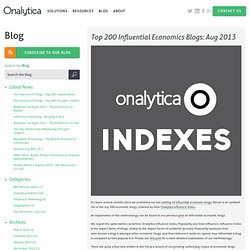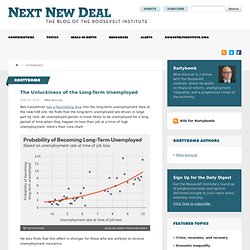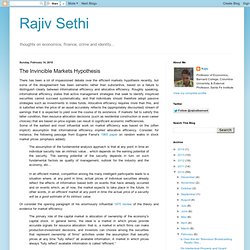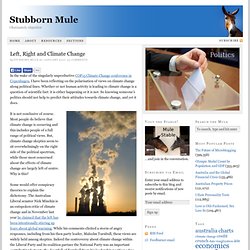

Top 200 Influential Economics Blogs – Aug 2013. It's been several months since we published our last ranking of influential economic blogs.

Below is an updated list of the top 200 economic blogs, ordered by their Onalytica Influence Index. An explanation of the methodology can be found in our previous post on influential economic blogs. We report the same metrics as before: Onalytica Influence Index, Popularity and Over-Influence. Influence Index is the impact factor of blogs, similar to the impact factor of academic journals; Popularity measures how well-known a blog is amongst other economic blogs, and Over-Influence seeks to capture how influential a blog is compared to how popular it is.
Complete List - The 25 Best Financial Blogs.
.DougSaunders. Next New Deal. (Wonkish.

Part One of Two. This part covers theory, part two some data.) Can the number of people quitting their jobs tell us anything useful about slack in the labor market? No. At most, it tells us to focus even more on the stuff we already knew to be watching. Evan Soltas has argued that the rate at which people quit their job tells us all we need to know about the unemployment rate, in particular how likely it is that the long-term unemployed and people who have left the labor force could be brought back into the labor force.
As a reminder, there are currently 2.5 million Americans who want a job but aren’t looking, and as such are counted as “marginally attached to the labor force” instead of unemployed.
Kleingut Griechenland. Economistsview. Macro business. Doug Short. .Rajiv Sethi Invincible Markets Hypoths. There has been a lot of impassioned debate over the efficient markets hypothesis recently, but some of the disagreement has been semantic rather than substantive, based on a failure to distinguish clearly between informational efficiency and allocative efficiency.

Roughly speaking, informational efficiency states that active management strategies that seek to identify mispriced securities cannot succeed systematically, and that individuals should therefore adopt passive strategies such as investments in index funds. Allocative efficiency requires more than this, and is satisfied when the price of an asset accurately reflects the (appropriately discounted) stream of earnings that it is expected to yield over the course of its existence. If markets fail to satisfy this latter condition, then resource allocation decisions (such as residential construction or even career choices) that are based on price signals can result in significant economic inefficiencies. Mr. Update (2/16). The Big Picture » Blog Archive » Letter from Chicago: F. In a post yesterday, my west coast pal Paul discusses how the Chicago School of Economics Circling the Theoretical Drain: “In the current issue of the New Yorker there is an alternatively depressing and fascinating piece (Letter from Chicago) by John Cassidy about how the Chicago School of economics – monetarism, rational expectations, efficient market theory, etc. – is circling the theoretical drain.

While some economists are abandoning the faith, many are not, and the result is, as Cassidy says, much like what happened in cosmology with Edwin Hubble discovered the expanding universe: Economists have lost their footing and are engaged in everything from rear-guard actions to active peer denunciations, and pretty much everything in between.” It reminded me of an amusing but true tale of Economics from College.
When I started my undergraduate work, I was a double major in Applied Mathematics & Physics. Both disciplines are based upon building blocks of logic, reason, and discipline. The Guardian Open Platform. Just over fifty 15-18 year olds descended on the Google offices in Victoria for Young Rewired State this last weekend.

Rewired State had drawn them there with this query: Fancy hacking the Government into shape? Want to create websites and applications that can help you, your school, town, country or the world? They came from across the country and worked so hard over two days using the data on Rewired State's data page, the Guardian data - and whatever else they could get their hands on. By the end of the weekend, they had created 16 applications and presented them to a room full of government, press, Googlers and those really interested in what they did. We're indebted to Stefan's Public Strategy blog to do what the ever busy Rewired State volunteer team didn't have the chance to do - to catalogue the hacks and awards! Four prizes were awarded: Movement for a Democratic Mixed Economy. Why social finance, and part. In the fourth of a series about innovation in banking, it’s worth looking at the business models of the new entrants who are trying to disrupt this space and pose the question: are they sustainable?
@AusMMT @Senexx. .maxineudall. Billy blog. Nakedcapitalism. @wonkmonk_ @webisteme. @went1955. Economonitor. John Quiggin. .Brad Fidler. .Stubborn Mule. In the wake of the singularly unproductive COP15 Climate Change conference in Copenhagen, I have been reflecting on the polarisation of views on climate change along political lines.

Whether or not human activity is leading to climate change is a question of scientific fact: it is either happening or it is not. So knowing someone’s politics should not help to predict their attitudes towards climate change, and yet it does. Pen and Parchment: Drawing in the Middle Ages « arkinet.